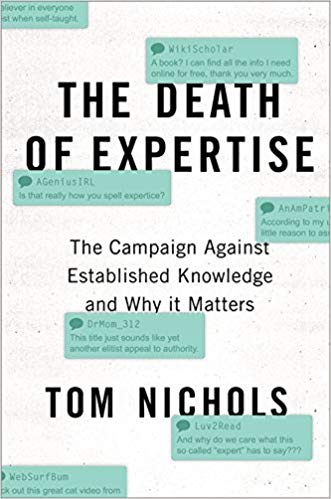The Death of Expertise Audiobook – Thomas M. Nichols (The Campaign against Established Knowledge and Why it Matters)

Queue
text
I have to begin this review with an admission: I wanted to like this book from the minute I check out the title. As well as I did. Tom Nichols’ The Fatality of Proficiency: The Campaign Against Established Knowledge as well as Why it Matters is a motivating– if at times a little depressing– review.
In the author’s words, his goal is to check out:
… the connection between professionals and also citizens in a freedom, why that relationship is breaking down, and what all of us, people and also professionals, could do concerning it.
This reverberates strongly with what I see playing out around the globe almost on a daily basis– from the dreadful state of power national politics in Australia, to the truthfully strange problem of public discussion on just about anything in the US as well as the UK.
Nichols’ emphasis gets on the United States, but the parallels with comparable countries are myriad. He expresses a deep concern that “the typical American” has base knowledge so low it has crashed with the floor of “unenlightened”, passed “misleaded” en route down, as well as is currently plunging to “aggressively wrong”. As well as this is playing out against a background in which people do not simply think “dumb points”, yet proactively resist any type of brand-new information that may endanger these ideas.
He does not assert this scenario is new, in itself– simply that it appears to be speeding up, and proliferating, at eye-watering speed.
Totally laced with this, Nichols grieves the degeneration of our capability to have constructive, positive public debate. The Death of Expertise Audiobook – Thomas M. Nichols Online (The Campaign against Established Knowledge and Why it Matters). He advises us that we are significantly in a world where difference is viewed as a personal insult. A globe where disagreement suggests conflict as opposed to dispute, and also ad hominem is the regulation as opposed to the exemption.
Once again, this is not always a new concern– yet it is definitely a growing one.
Guide covers a broad and also interconnected range of topics associated with its essential subject. It considers the contrast in between specialists and people, as well as highlights exactly how the incongruity in between these functions has been both created as well as intensified by the tiring and also often insult-laden nature of what masquerades public discussions.
Nichols also reflects on changes in the moderating influence of journalism on the partnership in between professionals and “citizens”. He reminds us of the ubiquity of Google and its duty in reinforcing the conflation of info, expertise and also experience.
His chapter on the contribution of college to the troubling partnership between experts and people particularly appeals to me as a scholastic. 2 of his points here exhibit academic community’s complicity in reducing this connection.
Nichols details his problem regarding the activity to treat pupils as customers, as well as the following over-reliance on the effectiveness as well as importance of student evaluation of their teachers. While not versus “minimal analysis”, he thinks:
Examining teachers creates a routine of mind in which the layman becomes familiar with evaluating the expert, regardless of being in a noticeable setting of having inferior understanding of the subject product.
Nichols likewise asserts this student-as-customer method to universities is accompanied by an implied, and additionally specific, nurturing of the idea that:
Emotion is an unassailable protection against knowledge, a moat of temper and also bitterness in which factor as well as knowledge quickly sink. And also when students find out that emotion trumps whatever else, it is a lesson they will certainly take with them for the remainder of their lives.
The pervasive attacks on experts as “elitists” in United States public discussion obtain little compassion in this publication (neither must these). Nichols sees these attacks as entrenched not a lot in lack of knowledge, much more as being rooted in:
… unproven pompousness, the outrage of a significantly narcissistic culture that can not endure even the smallest hint of inequality of any kind.
Connected to this, he sees a complication in the minds of several between basic concepts of democracy generally, as well as the partnership in between knowledge as well as democracy in particular.
Democracy is, Nichols reminds us, “a condition of political equal rights”: one person, one ballot, all of us equivalent in the eyes of the legislation. The Death of Expertise Audio Book Free. But in the United States a minimum of, he really feels individuals:
… currently think of freedom as a state of actual equal rights, in which every opinion is a good as any other on practically any subject imaginable. Sensations are more important than truths: if people believe vaccines are harmful … after that it is “undemocratic” and “elitist” to contradict them.